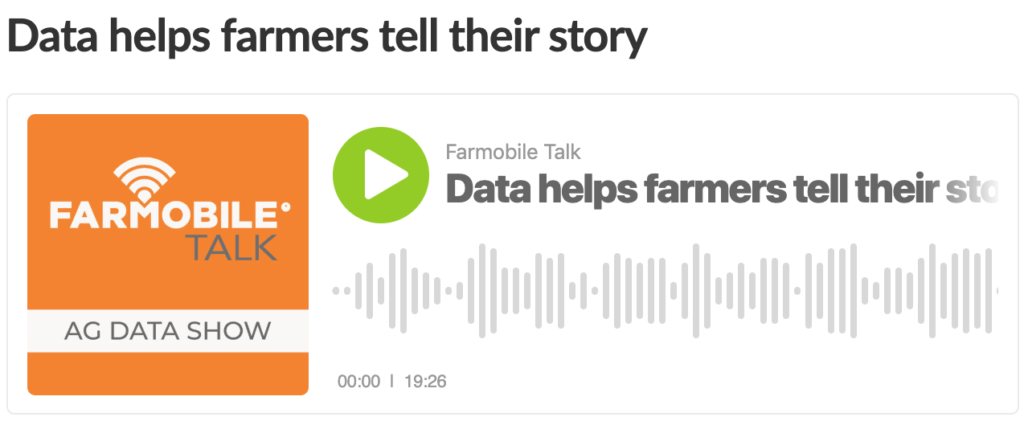Data helps tell a sustainability story
By Farmobile Editors
. . .
IN THIS FARMOBILE TALK: Jason Tatge, Farmobile CEO, and Bradford Warner, vice president of business development, sustainability, discuss his role at Farmobile and why data is so central to the farmers’ ability to tell the crop and stewardship story to the broader food industry and, ultimately, the importance to the future food supply.
With more than 20 years of diverse experience, Bradford Warner has deep know-how in results-based sustainability, product/service and channel development for the ag industry and consumer markets. In his role as Farmobile’s vice president of business development, sustainability, he is tasked with making new connections in the ag supply chain and Consumer Packaged Goods (CPG) sectors.
“We have a pretty big social responsibility in agriculture, which is the ability to find a way to feed — if you believe the Global Harvest numbers — somewhere around 9.6 billion people by 2035; and do it in a way that does not destroy ecosystems and still respect the economics of farmers,” he noted.
Today agriculture is still not on pace to do that.
In order to improve as an industry, the call-to-action for the supply chain is to find new ways to collaborate with famers, make sure the right information and right data is available, and there is a way to incentivize farmers and processors to collaborate and make continuous improvements. Bradford said that the industry has hosted many conversations, but it is not yet quite sure about how to deliver.
Farmobile’s role in helping farmers bridge the gap
Jason Tatge agreed, adding that one of the first steps is to help farmers tell their current crop and stewardship story to bridge the gap of understanding.
“Since I’ve been with Farmobile I’ve been on at least 300 farms … If there is one problem that we have is telling the story of those people … (especially) when you look at what these families are doing in the terms of being good stewards of the land.”
Farmobile’s goal is to help farmers tell their own stories and show how crops are grown and what practices are used in innovative new ways that benefit the environment. These stories can bridge the gap between food consumers and the people (farmers) who create the food.
The power of a data-driven story
It is the right time for farmers to tell a data-driven story. There is a growing information schism between consumers, who want to be more educated about the food they consume, but not always have the right information that relays the good work being done by American farmers.
“Information is power. Right now, as an industry, there’s a lot of data out there, but there is not a lot of good usable information that I’ve found in agriculture compared to other industries I’ve worked in,” said Bradford. “How do we fix that? I think at one level, we have to get a better fundamental data-driven picture of what goes on at the farm; so it’s not he said, she said. So that we have really good evidence of the great stewardship that is going on and where there are opportunities to improve. Those opportunities to improve, though, need to be taken in the context of how it continues to improve grower profitability while, at the same time, we are also assessing environmental outcomes.”
The farm data layers are missing from the public and policy conversations surrounding food production. Few are aware of the importance (and complexity) of the complex data layers critical to crop production. “We have to have data to bring people together” to proactively unify the groups. This will bring a new logic to “sustainably-sourced” conversations. Notes Bradford, “we’ll have quantitative (data) measures of what that means versus a lot of qualitative opinions.”
Tatge noted that Farmobile has low-cost after-market product that allows farmers to begin to track that kind of information that is being requested on the food buyer’s side.
Over the next couple of years, food producers and CPGs are going to continue to make improvements to help tell these stories. Bradford stated, “I think the people who can tell the better story about the product are going to be rewarded in terms of what they get paid for that having that additional information about how the crop was produced.”
Luckily Farmobile is in a good position to address these pain points in the industry and provide quality data insights that are easily shareable.
What is the difference between sustainability and other terms like traceability, trackability or identity preservation? And, how can real-time data begin to address these issues. Hear the whole conversation.
Listen to the extended conversation now:
